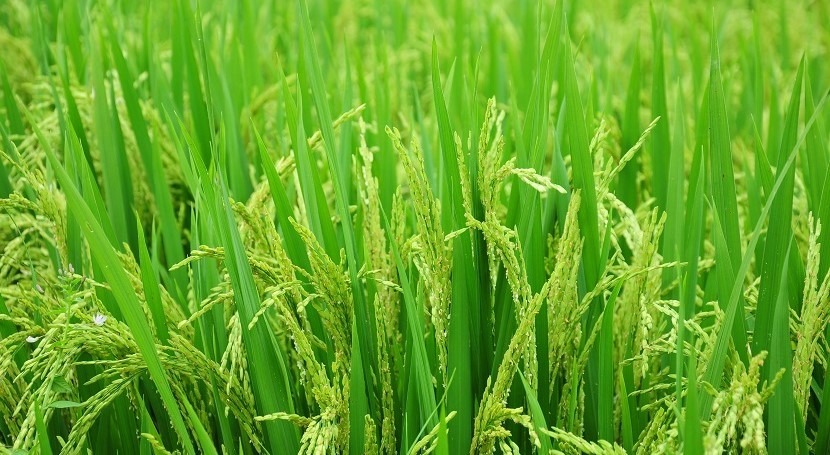Improved solar powered irrigation practices are securing lowland rice production in Liberia
In Liberia, rainfed agriculture has always been the predominant system to secure food and livelihoods, especially for the production of rice, Liberia’s main staple food.
Recent changes in climate and weather seasonality, with new patterns exacerbated by either floods or droughts, are calling for innovative solutions to secure the livelihood of Liberian farming communities as well as increase production to respond to the heavy dependence on imported staples, which makes the Liberian table vulnerable to global market price shocks.
A recent report of The World Bank highlights the gaps and constraints on rice production in Liberia, pointing at “limited access to technology, inefficient farming practices, low public and private investments, and a fragmented value chain, among other factors contributing to low productivity”. These gaps lead to an increase in imported rice prices, which continues to fuel food insecurity, poverty, and vulnerabilities in Liberia.
Securing water, irrigation, and innovative practices in rice production is crucial for Liberia to create resilient agriculture, cater to the national market, and pave the way to sustainable development.
The Environmental Protection Agency and the Ministry of Agriculture of Liberia reached out to CTCN to pilot innovative irrigation solutions to produce rice.
CTCN, through its network partners CARES Group Limited and INTEGRATION environment & energy GmbH, introduced Solar Powered Irrigation Systems (SPIS) technology as part of a System of Rice Intensification (SRI) pilot in the county of Bong, using the lessons learnt to formulate an enabling environment roadmap and a monitoring & evaluation framework for nationwide roll-out.
The technical assistance relied on the involvement and the indigenous knowledge of a wide range of stakeholders such as the Africa Rice Center, Community of Hope Agriculture Project, Climate Resilient Rice Production Project in West AFRICA (RICOWAS), Liberia Rice Farmers Cooperation, civil society, and members of farmers’ cooperatives. The project implementation built on the following milestones:
- Analysis of current irrigation and rice cultivation practices
- Design of SPIS technologies for SRI in lowland Bong county
- Small-scale pilot of the selected SPIS in Bong county
- Dissemination of training materials and workshops
Innovation doubles crop yields
Traditionally, lacking access to irrigation technologies, farmers in the area were able to grow a single crop of rice when their fields flooded during the rainy season.
With the adoption of Alternate Wetting and Drying (AWD) technology and water management technique, lowland rice can be cultivated and irrigated with much less water than the traditional system of maintaining continuous standing water in the crop field.
The new method consists of controlled and intermittent irrigation, following a periodic drying and re-flooding irrigation schedule in which the fields are allowed to dry for a few days before re-irrigation, without stressing the plants. Water usage is decreased by applying crop targeted drip irrigation thus ensuring sustainable use of the available surface or ground water resources. To avoid the high cost of electricity, the irrigation technique has been coupled with Solar Powered Irrigation Systems (SPIS), which, during the dry season, allows farmers to pump from existing water storages and distribute the water through a drip system.
The adoption of AWD coupled with SPIS enhances production providing the means for a second crop of rice and potentially a third season of vegetables, while reducing water demand for irrigation and greenhouse gas emissions.
“Irrigation and water management are a game-changer for farmers. It means not having to watch food crops die wondering how they will be able to feed their family. Farmers can no longer solely rely on traditional practices, and they are ready to embrace sustainable innovation that can increase production, moving from a subsistence model to a market one.” Prince D Peters, Chairman Fuamah District Multipurpose Cooperative Society
As part of a System of Rice Intensification (SRI) pilot, the technical assistance introduced more innovative elements to sustain increased production, for example building capacity on how to select rice seeds and raise nursery seedlings and optimize the transplanting spacing conditions for improved growth (less seeds for improved growth).
“We can no longer take water for granted. Instead, we all - from policy-makers to farmers - need to look at it as a precious resource, an asset that requires know-how and investments to produce benefits. This pilot project moves exactly in this direction, introducing innovative irrigation systems and strengthening the water-energy-food nexus at the basis of a more resilient country.” Halala Willie Kokulo, Division of Land Development and Water Resources, Department of technical Services Ministry of Agriculture
According to the Ministry of Agriculture this pilot is demonstrating a model that could have tremendous impact both at the micro and macro level, when implemented at the national scale.
“By intensifying production, we are securing the livelihoods of farmers but also reducing the dependance of food imports and markets, we are making agriculture profitable, hoping to attract more innovation and investments as well”, concluded Halala Willie Kokulo.
While the project is in its final stage and ready to be tested, CARES Group together with the Ministry of Agriculture are already exploring national and regional partnerships, and opportunities for scaling up investments and give access to SPIS technology to all smallholders in the country, making smart agriculture the default adaptation measure for rice production in Liberia.













